ABOUT THE BMW MOA FOUNDATION
ADVANCING RIDER SKILLS, EDUCATION, AND TRAINING
The Foundation’s History
On September 7, 2000, a new non-profit educational foundation named the BMW Motorcycle Owners of America Foundation was approved as a tax-exempt organization by the Internal Revenue Service. This is the story of the vision, dedication, and hard work that created this organization.
After a meeting of BMW club presidents at the International Rally in Fredericksburg, Texas, in 1997, BMW MOA Ambassador Clark Luster approached BMW MOA President Jeff Dean about the possibility of creating a tax-exempt foundation for motorcycle enthusiasts. Luster, who was the executive director for Presley Ridge Schools, a non-profit foundation for underprivileged children, imagined that motorcyclists might appreciate the opportunity to make tax-deductible gifts to an organization dedicated to the advancement of safety and education in motorcycling. Dean agreed.
Meet the MOA Foundation Directors
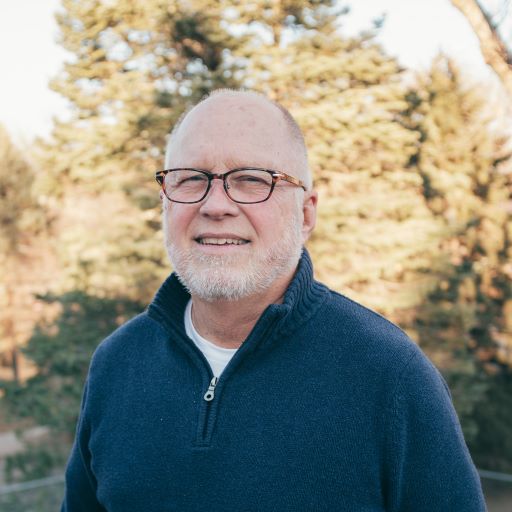
Steve Martin
MOA Foundation Chair
Steve is the current MOA Foundation Vice President. After a career in the commercial printing business, Steve sold his business and focused his expertise within the nonprofit sector in the role of Director of Development and with responsibilities including donor engagement and fundraising. Steve enjoys motorcycle travel worldwide and has ridden since 1970. He purchased his first BMW in 1995 and currently rides an R 1200 RT and a Ducati Monster.
Motorcycle training and safety are Steve’s passion. A couple of decades ago, Steve and his wife were returning home from a motorcycle ride and came upon the scene of a motorcycle crash. They later learned that the passenger, a mother of two little girls, was killed. With a drive to help reduce the number of motorcycle fatalities, he contacted his local community college to inquire about helping in their motorcycle training program. He was subsequently trained by the MSF and spent the next 10 years training new riders.
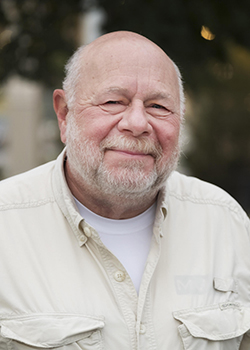
Tom Gary
MOA Foundation Vice Chair
Tom currently serves as the MOA Foundation Vice President and also made a lasting impact as President of the MOA FoundationTom has been riding since purchasing his first motorcycle in 1971, a new Honda CB 750 K1, and started motorcycle touring with his wife. He joined the BMW MOA in 2000 after purchasing his first BMW, and quickly realized that being a Life Member would insure he would always be part of the BMW community. He is also member of BMW Touring Club Detroit (Charter Club #1), were he was Vice-President and President. He is also a member of the BMW RA, where he is serving as a Regional Director. In addition he is a past Director/Treasurer of Curve Cowboy Reunion (Charter Club #282). Other memberships include AMA and local club Michigan Sport Touring Riders.
In addition to his passion for riding, Tom can be found in his workshop creating furniture and other wood projects for his family. Tom is excited to serve on the MOA Foundation Board and believes promoting rider training and safety is the best way to insure the future of motorcycle riding.. Retired from Norfolk Southern Corporation, a major railroad and logistic company, Tom has held several management positions over his 38-year career, ending with corporate responsibility for automotive operations and damage prevention. He has also served in many volunteer leadership roles notably as President of a credit union in Roanoke Va. Tom currently serves his local community as Planning Commissioner for York Township Michigan where he resides.
Tom believes the MOA Foundation is a rare opportunity to serve in a volunteer capacity that directly serves the members of an organization in a way the literally can save lives. Tom uses his business skills to raise money to further the mission of the foundation of advancing rider safety, education, and training. “I believe skill development and safety are totally fundamental to riding a motorcycle. It gives me great joy that as a Foundation we are impacting riders in a positive way. Guiding the Foundation future has been an honor.”
Tom became a Life Member in 2000 when he was encouraged to join the MOA by a fellow member soon after purchase of his first BMW. He has three BMW’s, the most recent a 2019 R 1250 RT.

Tami Bakke
MOA Foundation Secretary
Tami currently serves on the executive team as Secretary and chairs the committee charged with marketing and communications. Tami joined the MOA Foundation board of directors in January of 2023. She is happiest when she is learning new things and counts learning to ride a motorcycle as one of her favorites.
Tami has worked in varied roles throughout her career, including as a soldier (US Army Reserves), an art teacher, and a marketing manager and community coordinator for an incredible school for young children. She has also served on the board of directors for the BMW Riders of Tampa Bay near her home in Valrico, Florida.
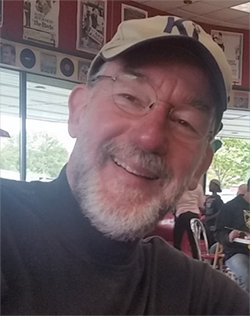
David Dunn
MOA Foundation Treasurer
David currently serves on the executive committee of the board of directors in the role of Treasurer. David has served on many non-profit boards and was elected multiple times to chair a large school board. He has donated his time toward helping many charities from United Way to Habitat for Humanity and Rotary. He is also a Paramedic (18 years) and now teaches EMS in the Lehigh Valley.
David came onto the MOAF Board because of his EMS experiences. While responding to motorcycle accidents, he saw riders who failed to wear proper gear, failed to negotiate corners or avoid obstacles, and who had over-run their abilities. He realized that skills training could help all riders — from beginners to long-term enthusiasts. He believes that assisting the MOA Foundation in raising money for skills development grants will help reduce motorcycle accident statistics.
David has been riding motorcycles since college except for a 15-year break while raising his kids. He came back to riding in 2004, while living in Vermont, when he purchased a 2002 R 1150 RT and joined the MOA.currently rides a 2020 R 1250 GS about 10K/year. He loves long distance touring, motorcycle camping and splitting his time between riding and working EMS at rallies. David says, “I look forward to growing the Foundation into a self-sustaining organization that supports rider safety, education and training. One day, I hope every rider participates in annual training events, no matter their skill level.” David and his wife Vikki have three grown children and two grandchildren.

Jim Nyffeler
MOA Foundation Director
Jim joined the board of directors of the MOA Foundation in January 2023 and serves on the Legacy Committee, which is charged with fund raising and donor relations. As he entered retirement, Jim’s interest in volunteering for the foundation was sparked during a conversation with the late Chuck Manley, a former director on both the BMW MOA and the BMW MOA Foundation boards. Chuck’s passion was an inspiration, so Jim stepped forward as a volunteer and was soon invited to serve on the board of directors.
An endorsed motorcyclist since 1993, Jim’s first bike was a Honda Pacific Coast. He currently rides a 2017 R1200RT and a G310GS and has owned several bikes over the years, including an R1150GS, F650 Dakar, F800GS, and R1150R. He is a member of the Knights of the Roundel #333.
Jim encourages every rider to seek additional skills development at least annually and is honored to help hundreds of riders to utilize the Paul Bachorz Individual Training Grant and the Clark Luster Group Training Grant to obtain professional rider training at a reduced cost.

Marshall “Marty” Martin
MOA Foundation Director
Marty chairs the Historical Archive committee and has served on the executive committee of the MOA Foundation in the role of secretary. Marty’s current role as Development and Operations Officer at the Naval Aviation Museum Foundation allows him to support the National Naval Aviation Museum in Pensacola, Florida. There, he focuses on exhibit design and improving the visitor experience. Marty’s experience in this role is invaluable to the BMW MOA Foundation because he is helping to develop the dream of building a Museum and Historical Archive that will document the unique story of MOA members, the organization, as well as inspiring a new generation of riders to be a part of motorcycling and hopefully the MOA.
Service is what drives Marty’s passion to serve MOA members. Marty says his work at the Foundation is most rewarding when we can provide training to riders that seek to perfect their craft of riding a motorcycle safely and responsibly. “While we are all able to ride a motorcycle, I enjoy the challenge of riding better each time I go out and taking a reflective look at how well I am doing. Taking a motorcycle training course has always been rewarding for me as it is vector check on how well I am doing and where I can improve.”
Marty has been a member of the MOA since 2015. He currently rides a 2012 R 1200 RT and a 2016 K 1600 GTL.
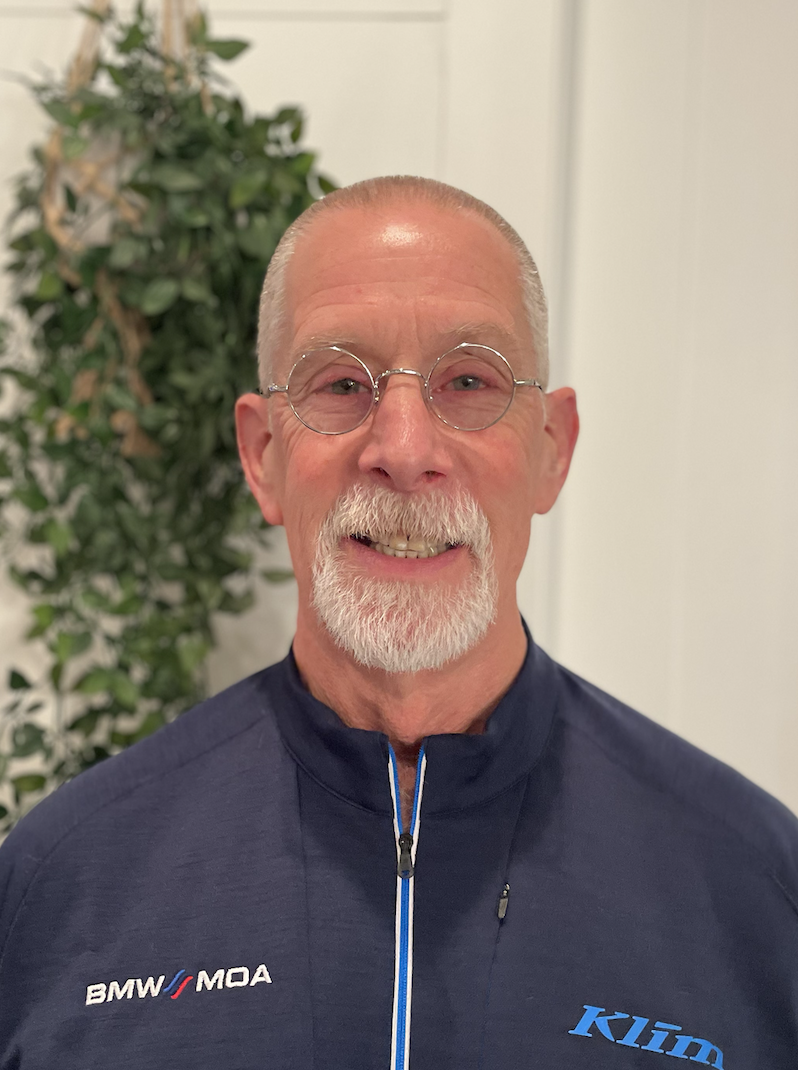
Bob Cohen
MOA Foundation Director
Bob joined the Board of Directors in January 2024, having been a MOA member since 2004. After retiring from his career as a veterinarian in early 2021, Bob took the opportunity to get involved with the MOA, joining his local charter club, and becoming a MOA Regional Coordinator in February 2022. It was in October 2023 when Bob attended one of the Premier Training sessions in Greer, SC that he had the opportunity to meet many of the MOAF Directors and was excited to volunteer and get involved with the Foundation’s mission.
Having experienced a couple of accidents over the many years and miles of riding, Bob is committed to advocating for regular rider training for all motorcyclists. Working with his fellow Board members, he’s looking forward to helping all motorcyclists become aware of and pursue regular training, and also working to build the SafeMiles Endowment to be a self-sustaining source of funds for rider training well into the future!
Bob has been riding motorcycles since his college days, when his best friend taught him to ride a Suzuki 185. There was no looking back after that, as there was almost always a motorcycle or two in the driveway or garage. He rode many Honda sport-touring machines through the 70’s and 80’s, purchasing his first BMW somewhere around 1988. And there have been many BMW’s since that time, along with an occasional MV Agusta, Ducati, and an Aprilia.
Bob lives on the Downeast Coast of Maine with his wife, Bonnie, as well as a couple of four-legged critters. He currently owns a 2018 R1200GS, a 2000 R1100S, a 1992 R100RS, and is restoring a 1986 R80.

Terry Fowler
MOA Foundation Director
Terry joined the board of directors in January 2024 after answering a call for volunteers. With decades of experience in financial management (healthcare industry) and executive level operations and his passion for riding, Terry embraces the mission of the Foundation as a way to help riders improve their skills no matter what type of riding they enjoy.
Terry has been riding motorcycles since the age of 12. His first bike was a Yamaha JT1. Terry obtained his street license at age 15 as a means of transportation to his first job. Over the years, he has enjoyed many types of riding including motocross, enduros, hair scrambles, desert events, and dual sport and sport touring.
Terry purchased his first BMW motorcycle in 2011. Currently, he enjoys riding a BMW R1250RT, a Beta 390 RRS, and an Aprilia Tuareg 660. Terry believes everyone should ride within their capabilities and encourages all riders to seek regular professional training as a way to optimize skills, safety, and enjoyment.

